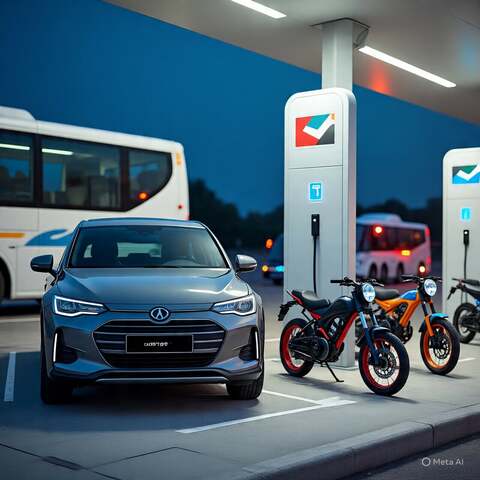ISLAMABAD: Prime Minister Shehbaz Sharif on Tuesday unveiled a national electric vehicle policy –Pakistan’s New Energy Vehicle (NEV) Policy 2025-30 – aimed at combating the country’s deepening climate crisis, as he called on international community to step up support for vulnerable states facing mounting environmental disasters.
Speaking at the launching ceremony, the prime minister declared the policy a cornerstone of the government’s environmental agenda, citing the country’s vulnerability to climate-induced disasters despite contributing minimally to global emissions.
Describing the Pakistan’s New Energy Vehicle (NEV) Policy 2025-30 as a “timely and essential step,” he said the transition to electric mobility marked a major milestone in the government’s green agenda – and a vital effort to reduce fossil fuel dependency in one of the world’s most climate-vulnerable nations.
“Pakistan is among the ten countries most affected by climate change,” he said. “While our carbon footprint is negligible, the impact on our people, economy, and infrastructure has been catastrophic.”
The policy includes subsidies for electric motorbikes and the distribution of 100,000 laptops to high-performing students. A 10 per cent quota has been allocated for students from Balochistan, with a focus on merit and inclusion.
Sharif’s remarks came with a stark warning: Pakistan cannot shoulder the cost of climate recovery alone. “We are no longer in a position to bear the weight of more loans or financial strain,” he said, appealing to the international community for greater assistance in rebuilding critical infrastructure and enhancing climate resilience.
The prime minister referenced the devastating 2022 floods – which killed nearly 100 people and caused over USD 30bn in damages– as well as recent monsoon flooding that has claimed more than 700 lives, with entire communities wiped out in the country’s mountainous north.
Sharif thanked the UK government and other partners for their support in shaping the policy and acknowledged the Ministry of Industries for its role in driving innovation.
Haroon Akhtar Khan, special assistant the prime minister on industries and production, said the shift to electric vehicles could generate thousands of jobs, cut petroleum demand, and help Pakistan position itself at the forefront of a “green industrial revolution.”
“This green revolution,” Khan said, “is the future of Pakistan.”
Federal Minister for National Food Security, Rana Tanveer Hussain, called the launch a “historic moment,” adding that the policy had been developed in alignment with international environmental standards. The event was attended by ministers, ambassadors, and top-performing students from Punjab, Sindh, Khyber Pakhtunkhwa, Balochistan, Gilgit-Baltistan and Azad Jammu & Kashmir.
The government is expected to propose an increase in the current Rs9billion education support budget in the next fiscal year.
Pakistan, which contributes less than 1 per cent to global carbon emissions, continues to face severe climate impacts – from floods and droughts to glacial melt and heat waves – making mitigation and adaptation a policy and survival imperative.
Copyright Business Recorder, 2025


